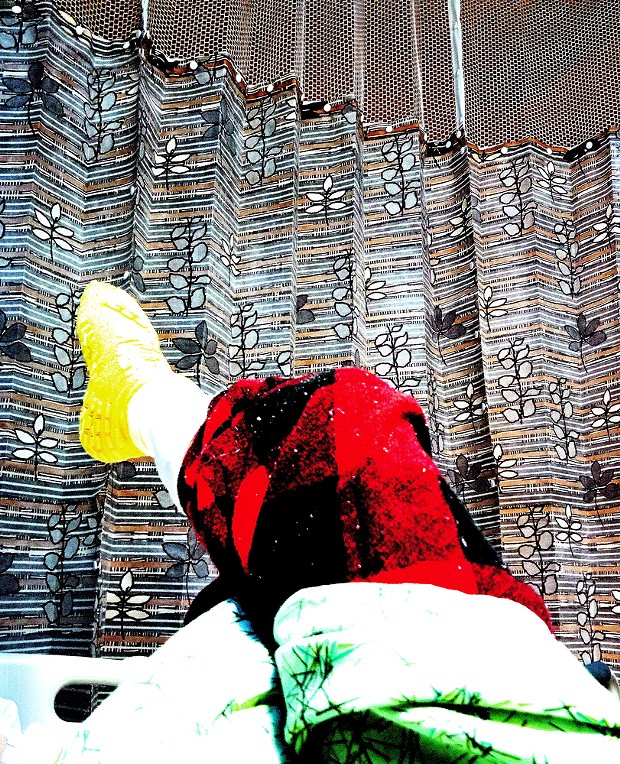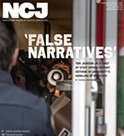[
{
"name": "Top Stories Video Pair",
"insertPoint": "7",
"component": "17087298",
"parentWrapperClass": "fdn-ads-inline-content-block",
"requiredCountToDisplay": "1"
}
]
The specter of COVID-19 is everywhere. It's the elephant in the room, the new "C word." But it's not the reason I'm here.
It's my sixth evening in the hospital. I had a major surgery to prevent paralysis by having a large calcium deposit removed from my thoracic spine. By day six I've gotten permission to walk unassisted around the halls of my unit, a portable monitor connected to wires folded into the pocket of my hospital gown.
When I'd first exited my room, I neglected to put on a mask. After I'd gone about 20 paces, my cane tapping the ground, a staff member looked up, alarmed, to remind me. But as I turned to go back she hurriedly handed me one from beneath her computer station. It was pink and I put it on quickly, apologetically.
Amid quiet purposeful footsteps up and down uncarpeted hallways, masked staff members occasionally nodding at me, and hushed, seemingly urgent conversations at nursing stations, I think I hear someone say: "We have a patient who has a broken heart."
I feel as if I've entered another realm after so much time spent in a shared room separated by curtains. I'll walk as long as I can stand it, I tell myself.
And as I walk I ponder things like how many COVID patients are in this hospital. Or how many have occupied my bed.
My surgery had been scheduled for the end of December and my hope for the coming year was that the pandemic would fade away and the world would begin to recover; and of course that my own healing would progress nicely, as well.
A friend had dropped me off early on a cool Tuesday morning. My temperature taken, double masked, I was directed to a cluster of chairs where I'd been told to take one with a sign that said CLEAN. I sat in the only one without a DIRTY sign. How often were they disinfected? I'd had my two Moderna shots months earlier. My excuse for not getting a booster was all the pre-surgery depression and ennui I'd been experiencing for months, not to mention the changing data on efficacy, and my propensity for procrastination.
As I became gradually more aware of my surroundings after a several-hour long surgery, I found myself in a shared room with another woman who I would later surmise was dying. A peppy nurse said she needed to ask me some "annoying" questions, then inquired about my religious affiliation, gender preference ... and eventually, a question I was surprised she hadn't asked first: Had I been vaccinated.
I answered the questions in a sleepy voice, and noticed the cheerful nurse was wearing a face shield in addition to her regular mask. After she left I began the first of numerous attempts to sleep. Needless to say that's a challenge in an environment with bright lights and beeping monitors; with ear plugs that had a way of falling out of my small ears, and with the groans, sobs, and cries of pain coming from my roommate on the other side of the curtain. She was suffering greatly.
The nurses and doctors all had phones that seemed to ring importantly at regular intervals and as some tended to me — taking my temperature, administering meds, checking my blood pressure, adjusting wires; repeated every few hours around the clock — others would hover and comfort my roommate, not unlike concerned parents, mumbling such things as:
"I'm so so sorry to have to do this to you again, but we've got to get you cleaned up."
"Your hair's so pretty. I'll bet you used to get your nails done, too."
"Oh sweetie, you haven't eaten all day."
"Skin like paper ..."
It's not as important to recount how I knew she was in the last days of her life as it is to note the sincerity and compassion I heard in the voices of all those helping her. The day before she was taken someplace else in the middle of the night, family members came to cry by her bedside or talk so softly I found myself inadvertently straining to hear what they said. Since most of the time I couldn't sleep anyway I became caught up in what was happening on the other side of the curtain.
My hopes of getting more than a couple minutes of real sleep after my roommate left were dashed soon afterward, when the other side of our shared room was quickly cleaned and another woman admitted in the wee hours. Bleary-eyed and resigned, I at least had the reassurance of overhearing her say she was vaccinated.
There are things you think you overhear, like, "We have a patient with a broken heart."
There are things you want to hear, like, "You'll be going home today." I stayed at the hospital longer than expected because my daily x-rays, some taken before daybreak while I was still in bed, had to show my lungs were clear of fluid before I could be discharged.
Then there are the things you can't help but hear (paraphrased), like:
"Thirteen people called in sick today ... that's like half our staff!" (This was on New Year's Eve.)
"People are quitting because they're afraid of getting sick ... Too many patients being admitted are unvaccinated."
"None of the nurses aides are working tonight."
"They're gonna make us require proof of boosters soon."
"FEMA's doing some of the work here."
"I'm on a mission to find you prune juice."
"You pressed the call button because you needed ChapStick?" ("Well, I need water, too," I'd replied sheepishly, after waiting half an hour for a response.)
"I'm doing my best."
"I love my job."
"I can give you melatonin."
As I walk the halls on day six of my hospital stay, the day before I would finally be discharged, I make an effort to be extra observant.
The walls are beige. The light is unflatteringly bright. My brain feels foggy so I try to memorize signs:
Caution Wet Floor. Negative Pressure Room. Danger High Voltage. Keep Out. ICU Waiting Room. There are staff lockers and a photo of the ocean; a print that reminds me of being in Greece. Nursing stations like immaculate pods in a florescent lit, alternate universe.
Who was St. Joseph, I wonder. It's the name of the hospital I'm in, which is in the process of transitioning to a new name while retaining its Catholic foundation.
I'm not religious but I'm spiritual. There's so much I don't know. But I believe things happen for a reason.
There's a reason I was given a time slot for this operation, at a time when we may be on the cusp of deferring many, many procedures and surgeries. Again. That is, if COVID-19 and its variants continue rearing their unforgiving heads.
By now I'm convinced more than ever that most nurses and doctors are saints, along with all the other employees who staff hospitals and health clinics everywhere.
At St. Joseph, several seconds of a charming lullaby are played over the loudspeakers every time a baby is born there. I think four mothers gave birth during my week long stay. I refuse to envision the next generation growing up under a never-ending pandemic.
Annie Kassof (she/her) is a freelance writer and artist living in Humboldt County.
Comments (2)
Showing 1-2 of 2
































